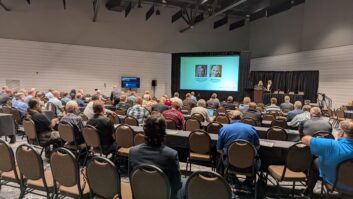The author is membership program director of the National Federation of Community Broadcasters. NFCB commentaries are featured regularly at www.radioworld.com.
Has FCC Chairman Ajit Pai granted community radio and low-power FM a late Christmas gift? Hard to say, but the latest commission moves are causing a stir much more than a mouse.
Hours before the Federal Communications Commission ceased most operations amid the government shutdown, it posted the agenda for its Jan. 30 meeting. As usual, the schedule is ambitious. There are some exciting considerations on the table.
[Read: Community Broadcaster: A Year of Change]
For low- and full-power noncommercial radio, a Notice of Proposed Rulemaking herein will draw a great deal of interest. What is known as MB Docket 19-3 contains several reforms that surely will be explored later this month by commissioners, including the newly appointed Geoffrey Starks as well as Brendan Carr, just approved to serve a full term.
Why should community broadcasters take notice?
For LPFM, the FCC’s proposals are sweeping. Among the most noteworthy changes include a proposal to extend the LPFM construction period from 18 months to three years. That’s a groundbreaking reform, considering how many low-power stations genuinely struggled to meet the demands of a year-and-a-half construction permit window. When you consider the myriad technical and broadcast demands to get on the air, it should come as no surprise that more than a few stations filed for extensions or simply gave up.
Time sharing was a bone of contention in the previous LPFM filing windows, especially in populous areas, and the FCC is seeking to clarify rules. For the uninitiated, time sharing is in essence an agreement that several applicants for a LPFM space allot the 168-hour broadcast week based on the applicants’ interests and capacity. Complications could, of course, arise if an applicant dropped out, was added, or another change impacting the time share. New regulations would delineate FCC oversight in reviewing such agreements, dispensation of time in the event of changes, and other unforeseen issues.
Such a shift might not be as relevant until a new opportunity for LPFM filings happen, but the fact it is coming up now is a conversation starter if ever there was one.
Full- and low-power stations may see benefits in proposed reforms in the area of boards. Composition of a station’s board of directors is considered rather essential by the FCC, requiring filings and other documentation. Under proposed rules, gradual board changes will be regarded as minor and thus not subject to the same scrutiny, provided the organization and its mission remains fundamentally the same. Such has to be welcome news to the many community radio stations that have varied board election statutes in their bylaws and may parcel off board selection in whole or part. Regardless, changes of more than 50% of a board’s composition will require more filing and attention. This matter may be particularly delicate if and when a new LPFM filing window opens; board changes of 50% or more could result in application dismissal, should they come during future filing windows.
In other January actions, the FCC will look to close a loophole in LPFM applications in what can be construed as a continuance of the commission’s ongoing battle with unlicensed “pirate” broadcasters. Under the current rules, a station application could be dismissed if a person on the board of directors was involved in unlicensed broadcasting. However, opaque procedural actions by the applicant could effectively save the application from dismissal by removing parties formerly engaged in pirate broadcasting. Such was the case during the filing window six years ago, where ex-pirate broadcasters showed up on various rolls. Should the January changes be approved, that loophole would disappear for all intents and purposes.
Those are just a few of the alterations Pai and team are considering at the end of the month. The full review and rationale are quite extensive.
With the FCC closed due to the government shutdown, it is thus far unclear when the agenda items will be open for comments by the public. The next commission meeting is scheduled later this month.
Credit must go to REC Networks’ Michelle Bradley for her tireless efforts, the many heroic LPFM broadcasters coast to coast and members of the public who have filed comments, written commissioners and appealed for refinements. The effects of these proposals appear promising, and portend more attention for low-power broadcasting and the needs of noncommercial media as a whole. We shall find out much more on Jan. 30.







